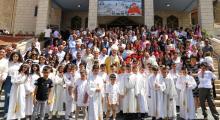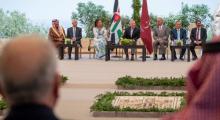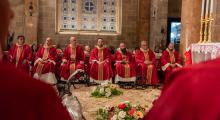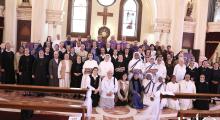Issued by the Catholic Center for Studies and Media - Jordan. Editor-in-chief Fr. Rif'at Bader - موقع أبونا abouna.org

The Holy See has all the time been massing efforts, whenever an opportunity arises, to call for ending wars and for restoring peace worldwide by resorting to direct negotiations in order to reach common understandings, as well as for eliminating nuclear weapons.
A recent call in this direction is represented in the address made by Archbishop Ivan Jurkovič, Vatican Permanent Observer to the UN, for adherence to the Convention on Cluster Munitions (CCM).
Reiterating the Holy See's determination to contribute to the universal adherence to the (CCM), which was signed in 2008 by over 100 states to address the humanitarian consequences caused to civilians by cluster munitions, Archbishop Ivan Jurkovič expressed the Holy See’s appreciation for the efforts made towards the universalization of the convention.
Catholic Church condemns using, storing nuclear weapons
During his visit to Nagasaki and Hiroshima on November 24, 2019, Pope Francis stated that the use of atomic energy for purposes of war is a crime. He condemned not only the use of nuclear weapons but also their possession.
A similar position was undertaken by Pope John XXIII when he issued his encyclical on April 11, 1963 titled, "Pacem in Terris" which called for establishing universal peace in truth, justice, charity, and liberty. This encyclical depicts the position of the Catholic Church which positioned itself on the front line in the fight against nuclear devices and even against testing them which would lead to serious danger for various forms of life on Earth.
Furthermore during the Cold War, the Pontifical Academy of Sciences, which was founded in 1936 by Pope Pius XI, served in creating a forum for dialogue between faith and science.
All in all, the Catholic Church's teaching about nuclear weapons implies concern to protect human life, which is an acknowledgement that peace is ultimately built on justice and that there should be a need to place strict moral limits on the use of force.
In 1954, Pope Pius XII argued that every possible effort must be made to avert atomic warfare through international agreement. He also made the moral argument that the use of force must be limited to self-defence within rigid limitations.
With the Catholic Church's unstinting efforts over the years to put an end to wars and to eliminate weapons of mass destruction, it is now the optimum time to solve all global disputes through diplomatic channels, to divert attention towards producing enough food in order to feed millions of starving people, as well as to promote scientific studies that aim at solving the world's endless problems.
The Bible contains numerous verses on peace, among which is this one:







